Movies & TV / Columns
The Top 20 Movies of 2022 (#20 – 11)
 Image Credit: Aidan Monaghan/Focus Features
Image Credit: Aidan Monaghan/Focus Features
Welcome, one and all, to the start of my Movies Year in Review for 2022! I’m your host Jeremy Thomas, and today we’ll kicking off our look at the best and worst films of the past 12 months. Keep in mind that this list is meant to be my personal opinion and not a definitive list. You’re free to disagree; you can even say my list is wrong but stating that an opinion is “wrong” is just silly. With that in mind, let’s get right into it!
My 2022 Movies Year in Review launched last week with the worst of the year, and with those films out of the way it’s time to look at the best. 2022 was a year that saw the movie industry further its attempt to return to normalcy as it reckoned with the change brought by the streaming industry (and the streaming industry had its own reckoning on content). That clash led to a nice mix of films giant and small that stole hearts and minds, from indie horror and big blockbuster action to some of the strangest hits in a long time. This year’s Best Of list includes a little of all of that, plus a few other films that came out of nowhere to blow me away. Without further ado, let’s just dive right in and take a look.
Caveat: My criteria for a film qualifying for this list is simple: if a narrative film had its domestic release this past year, either theatrically or on VOD or a major streaming service, then it was eligible. The only other caveat is that I have tried, but have not seen everything that was released in 2022, especially factoring in streaming services. The films that I missed that could have possibly qualified based on reputation were Aftersun, Belle, All’s Quiet On the Western Front, and Vortex. Other than that, I feel reasonably confident I would have seen just about every movie that would have likely made the list. For those curious, I saw a total of 182 films that were released in 2022 (up from last year’s 168).
Just Missing the Cut
• Turning Red
• Black Panther: Wakanda Forever
• Emily The Criminal
• Hellbender
• The Outfit
#20: Midnight
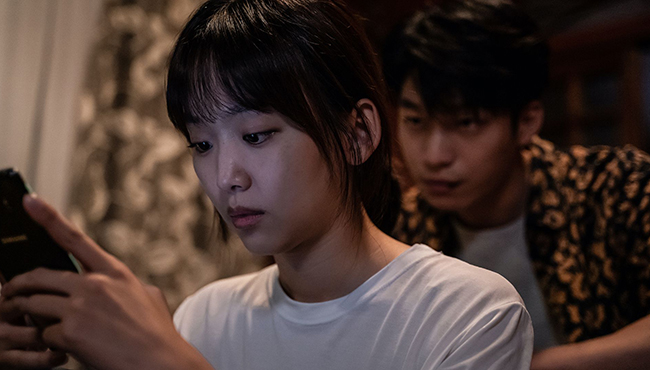
Breaking into the top 20 is one of a couple cinematic entries from South Korea to make the list this year. Midnight is the directorial debut of Kwon Oh-seung and if this film is any indication, he’s well on his way toward inclusion with the masters of Korean genre filmmaking. This white-knuckle thriller about a serial killer stalking a deaf woman across the city in which they live brings to mind Mike Flanagan’s solid 2016 home invasion thriller Hush, but with a bigger scale and more complex characters. Jin Ki-joo and Wi Ha-joon shine as Kim Kyung-mi and Do-sik, the woman and killer respectively, who prove equally resourceful in the cat-and-mouse game that barely takes a moment to let the audience breathe.
Kwon proves himself an adept filmmaker here, with his use of lighting and space keeping things visually interesting as the film (and Do-sik’s hunt) progresses. There are some standout uses to technology within the context of the film that build the tension, and Kwon’s sound team is at their top of the game in terms of putting us in Kyung-mi’s perspective without it feeling too obtrusive. But above all, this is a thriller that respects its characters and knows how to make them appear formidable without compromising each other, a tricky balancing that many films try at but most come up short at doing.
It’s difficult for thrillers like this to really make their mark sometimes, simply because rewatch value can be lower when you know what’s going to happen. Not so with Midnight, which doesn’t just rely on the suspense. Kwon takes the time to let audiences invest in what’s happening on the screen and there’s so much to appreciate from a technical level that rewatches hold up. Midnight was one of the most pleasant, out of nowhere surprises of 2022, and one I can easily see myself revisiting many times to come.
#19: Mad God
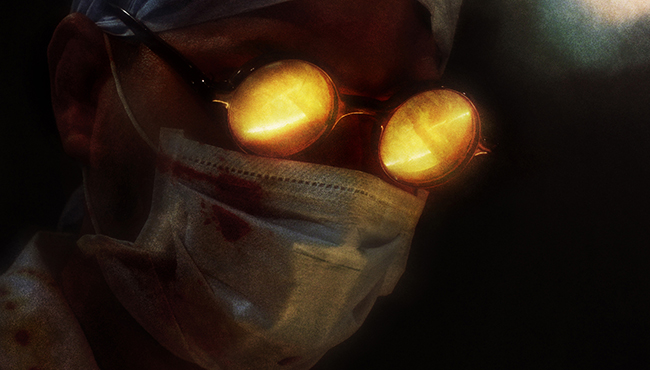
Phil Tippett’s contributions to cinema are undeniable when it comes to visual effects. Just look up his filmography and see the iconic films that he’s worked on from Dragonslayer and Star Wars to Robocop, Honey, I Shrunk the Kids and many other; it’s difficult to understand his influence. And yet somehow, Mad God is his crowning achievement. The story behind this stop-motion experience is legendary. Tippett began working on it some 30 years ago and gave up after Jurassic Park because he thought that stop-motion would die out, only to be convinced to pick it back up years later.
I’m glad he chose to return to this film and finish it up, because this gnarly little piece of surrealism is exactly my kind of strangeness. Tippett’s passion project is a challenging film to be sure, and it will turn some people off with its lack of linear narrative or dialogue, its visceral grossness, and the generally wild swings that it takes. To try to describe Mad God’s plot isn’t just difficult; it misses the point entirely. Sure, there is a story here that you can run through but this is a lot like Eraserhead (side note: if you don’t like Eraserhead, avoid this). It is less interested in a narrative story than it is experimentation and personal exploration. And if you can handle that, then you’re in for a ride.
Even if the film isn’t for you (and again, I don’t blame you), it’s hard to deny how fantastic it is on a technical level. This thing has such a beautiful level of grotesquery that you can’t look away even if you want to. The sheer amount of work that had to be put into it is mind-boggling; that it comes out looking this good at all is inspiring in a strange way. Unrelentingly dark and full of the bleakest dystopia, it’s rides on a tidal wave of vibes, few of which are comforting. Mad God is the kind of love it or hate it movie that becomes a cult classic, a title that this visually-stunning life’s work very much deserves.
#18: The Menu
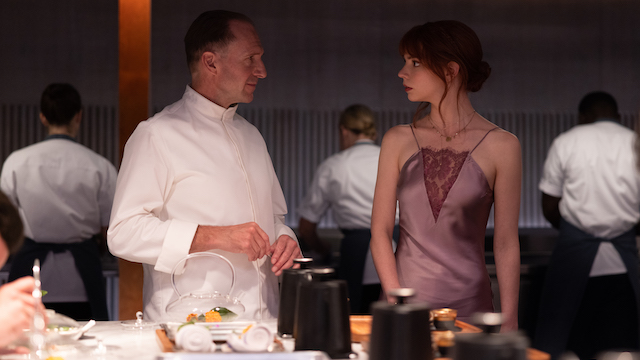
Comedy is hard; satire is harder. It’s telling how few comedies have really scored at the box office in the last several years, unless it is comedy within something as marketable as an animated family film. But the ability to make insightful and piercing points while still being funny — that’s a trick that even fewer people have mastered. The Menu makes a strong argument that Mark Mylod is one of those rare few. This bitingly sharp and often-darkly hilarious thriller about pretension, class structure, critics and much more had me enthralled from the first frame to the last.
Much of that is thanks to the cast absolutely slaying here, most notably Anya Taylor-Joy and Ralph Fiennes. Taylor-Joy is our “eyes of the audience” character, a woman attending an exclusive dinner from a mega-chef whose dishes are works of art. I’ve always been a huge fan of Taylor-Joy, but she’s perhaps at her best here in playing Margot, a woman who is in over her head on this island of rich assholes and deadly threats — and she knows it, but she’s also quite resourceful and crafty. And Fiennes gives an intense but effectively nuanced performance as the Chef Julian Slowik , the man who is leading the foodie show. The rest of the cast is also quite good, too; special shoutouts go to Aimee Carrero as the assistant to John Leguizamo’s famous actor character and Hong Chau as Elsa, Julian’s right hand.
Now, I have to admit that I am not a foodie. At all. I appreciate those who love it, but it’s not my thing. That doesn’t stop the film from feeling incredibly relatable as it pricelessly pokes barbed fun at the utter pretension of high cuisine. And the script from Seth Reiss and Will Tracy doesn’t stop there; it has some very pointed things to say about class structure and how we treat people in the service industry, though it never feels like it’s being preachy about it. And while it’s all ridiculous, Mylod’s direction keeps it just grounded enough that the silliness never breaks suspension of disbelief. Sure, it may be completely on the nose in some parts, but it is able to walk the careful line of its humor and thrillers. This was 100% my jam, and I loved just about every delicious minute.
#17: The Fallout

Megan Park’s The Fallout is a film that makes a strong argument for the value of original content from streaming services. It isn’t crazy to surmise that this teen drama wouldn’t have done much business in theaters; it isn’t a crowd pleaser and would have been tricky to market in the best of situations. And yet, it’s a powerful drama and vibrant drama that packs a major punch, which made it perfect for a streaming service like HBO Max where it could find its audience. Set in the aftermath of a school shooting, the strong performances by Jenna Ortega and Maddie Ziegler highlight some exceptional work from the script in balancing a very tricky tone while also never losing sight of its subjects.
The topic of school gun violence has been used many times in films before, although many (not all) of the past examples have focused on the killers. That isn’t The Fallout’s goal. In fact, we learn barely anything about the perpetrator here. Just as important is the fact that Park isn’t interested in making pat political statements about the matter. Instead, she keeps her focus on Ortega’s Vada and Ziegler’s Mia as they, their friends, and their families try to navigate the grief, trauma and survivor’s guilt that follow the incident. After an exceedingly difficult to watch early scene in which Vada, Mia and Niles Fitch’s Quinton hide in the bathroom during the shooting, the film sets out to show how they handle their trauma — and notably, how there’s not one answer for it. Parks imbues the film with a tone that shifts wildly between sorrow, terror and humor, and it never once feels false.
Ortega has had a breakout year in 2022 — and we’ll get to another example of that in the next part. She’s is arguably last year’s biggest new star, and The Fallout is without question her best performance of the year. She strikes up a natural, pained chemistry with Ziegler, who nicely rebounds from last year’s Music as Mia, showing how good she can be with a good script and direction. And the supporting cast (including Fitch, Lumi Pollack, Shailene Woodley, and Julie Bowen) are perfectly on point. The Fallout isn’t one of the easiest watches of the year, but it is a rewarding one that deserves all the praise it gets.
#16: Puss in Boots: The Last Wish
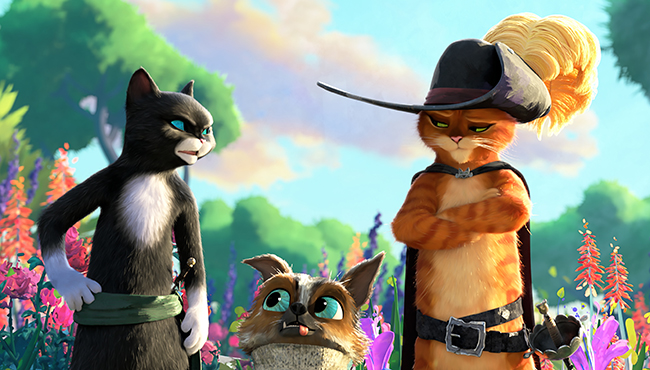
If you would have told me at the start of 2022 that a Puss In Boots sequel would end up in my top 20 of the year, I probably would have rolled my eyes at you. And yet, here we are. No hate to the franchise, but the original Puss In Boots is almost 12 years old and it was fine, but it wasn’t a particularly memorable film. I never imagined there was much demand for a sequel, but I can admit when I’m wrong. The bigger surprise is how The Last Wish leapfrogs its predecessor to become the third (and arguably the second) best film of the Shrek franchise on the back of a charming script and some very impressive visuals.
Antonio Banderas and Salma Hayek were the best part of the original film, and they’re right back in top form here as the titular Puss and his (now) ex-fiancée Kitty Softpaws. The script captures that right tone of Zorro-esque swagger and fairy tale magic, casting Puss in a literal race against Death as he works with Kitty and Harvey Guillén’s therapy dog Perrito to beat a cast of characters to a wish. It’s silly in the right way and leans into the same elements that made Shrek and Shrek 2 successful, playing with its fairy tale characters in fun and gently subversive ways.
The visual work is what truly sets this one apart though. The animation team drew inspiration from Into the Spider-Verse to add a storybook feel to the sequences, and it makes an immediate impact in how it stands out from the rest of the franchise. It’s just different enough to maintain a visual consistency with the previous films while still being able to dazzle. The action is a blast, the jokes are wittier than we might expect from a family film, and the characters are memorable in the best ways. I certainly didn’t think I would say this at the end of 2022, but I’d love to see where the franchise goes from here.
#15: Pearl

Horror had another exceptionally strong year in 2022, both in terms of bigger-budget studio fare and indie efforts. We saw the rise of new stars in the genre and the return of some great filmmakers, both of which are present in Pearl. Ti West’s prequel to his OTHER 2022 horror film X is less of a bloody frightfest — though there is some of that — and more of a character study about a horror villain in the making. Filmed at the same time as X, it stars Jenna Ortega’s fellow new horror “it girl” in Mia Goth as the titular character in 1918, trying to survive life with her overbearing mother in the wake of the influenza pandemic and with the nation at war.
Where X is an ensemble piece, Pearl is very much a star vehicle for Goth and she makes the most of it. She gets deep inside Pearl’s mind and shows us why this young woman heads down the deadly road that she does. Goth allows us to empathize with Pearl without excusing what she does. West is quite slick here as he throws in nods to the Golden Age of Hollywood in sly, subversive ways. Pearl is a lonely, damaged girl who has latched onto the silver screen in the hopes of an escape, and she pursues that dream down a road that we know isn’t going to go well for anyone. The trip is a lot of fun and clever to boot, keeping things on edge until they’re ready to explode in bloody pitchforks and worse.
While there’s a lot that could be said about how Pearl is rather timely in certain aspects, the true strength of this film is seeing Goth in top form. She takes Pearl through a hell of an emotional arc, delivering a captivating eight minute monologue — almost five and a half minutes of which is uninterrupted — which would be the best single-scene performance of the year if Rebecca Hall’s similarly captivating monologue in Resurrection hadn’t happened. Pearl helped herald the return of a talented voice in horror in Ti West, and pushed Goth’s star ever higher. With films like this and talent like them, the future of the genre is bloody and bright.
#14: The Fabelmans
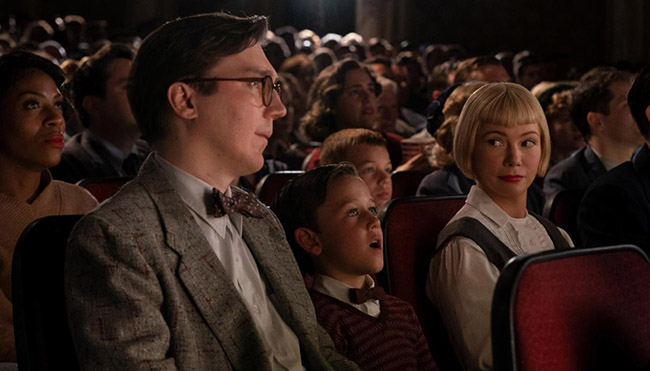
It’s nice to see Steven Spielberg back in his groove as of late. The iconic director had a fairly spotty period in the mid-late 2000s and 2010, with misfires like Indiana Jones and the Kingdom of the Crystal Skull, War of the Worlds, The BFG, and Ready Player One counterbalancing the success of Lincoln, Bridge of Spies, and such. Even many of his successes, while great films in their own right, often seemed to be missing the quintessential magic and wonder that Spielberg is able to invest in his more personal and inspired works.
It’s probably no surprise then that The Fabelmans, arguably his most personal film yet, is also one of his best in recent memory. The semi-autobiographical drama is a tale about a young man’s love of the movies, and how the power of making films helps him properly contextualize the world and family around him. Spielberg’s script (co-written with Tony Kushner) feels authentic in the best way, bringing us into his world of cinematic nostalgia and capturing something truthful to what could have been a fairly standard coming-of-age tale.
When you’re sit down to watch a Spielberg film, you can be guaranteed one thing if nothing else: the period look and feel will be on point. This is no exception; Spielberg returns to the glow-y nostalgia that made so many of his ’80s films classics. He also wrings plenty of heart out of his story, ably aided through some strong performances by Michelle Williams, Paul Dano, and both Gabriel LaBelle and Mateo Zoryan Francis-DeFord as the young Sammy Fabelman at different ages. This is one of Spielberg’s more conventional films, but it’s also one of his most heartfelt in recent memory without getting too schmaltzy. It’s simply an incredibly well-constructed drama, and there’s nothing wrong with that.
#13: We’re All Going to the World’s Fair

When looking for body horror in 2022, most people probably looked to David Cronenberg’s Crimes of the Future to deliver the strongest. But for my money, that honor belongs to We’re All Going to The World’s Fair. I first had the opportunity to watch this while covering Fantasia Fest in 2021 and I was immediately struck by how well this unnerving, fascinating picture combined surreal body sequences with psychological drama and coming-of-age elements to create an unsettling and thought-provoking look at the effects of isolation on us in the internet age. It’s quite a timely topic for many, many obvious reasons, and it’s brought to uncomfortable life by director Jane Schoenbrun and star Anna Cobb.
Schoenbrun displays quite a deft touch with this film, which follows a lonely and withdrawn teenager named Casey who delves into a spiral provoked by her participation in an urban legend-turned-online RPG of sorts. Cobb’s performance as Casey is compelling and often heart-wrenching, to the point that it’s shocking to realize this is her feature film debut. Schoenbrun explores the concepts of identity and connection through the internet and in both positive and negative ways, keeping the viewer as in the dark as Casey about the true intentions behind the screens particularly as a second character contacts her and forms a connection. Schoenbrun also explores the idea of gender dysphoria, imparting onto Casey (and thus, through Cobb’s performance the viewers) a real sense of what it can feel like.
The film is a slow build, told through a mix of ScreenLife sensibilities and more traditional photography as Casey watches other people’s physical changes from playing the game while undergoing her own changes. It’s a canny choice that allows Cobb to endear us to the character and makes the subtle horror of her progression quite unsettling. The minimalist approach is augmented with some stellar sound design and a few creepily creative approaches of the online game itself. This film isn’t for those who prefer their horror big, loud, and faster paced, but for fans of bold, psychologically unsettling drama it resonates as one of the most quietly disturbing and affecting films of 2022.
#12: The Northman

I’m never going to say that a filmmaker is infallible, because it’s not true. That said, Robert Eggers hasn’t failed me yet. The man behind The Witch and The Lighthouse leaned away from his slow burn horror comfort zone for The Northman, his first real big-budget effort. And while the results may not have paid off financially for this $70 million epic, they hit the mark from a viscerally entertaining standpoint. Eggers puts his hefty budget to good use in this telling of the legend of Amleth, the Scandinavian legend that served as the inspiration for Hamlet. Alexander Skarsgård makes the most of his opportunity to shine on the big screen at last and embodies the titular prince who seeks revenge for his father’s murder, only to find the vow more complicated than he imagined.
It goes without saying that Skarsgård looks the part to play a Viking warrior, but he also rises to the occasion as an on-screen presence. Amleth is often little more than a force of nature, driven by his need to fulfill his duty to his dead father. Skarsgård’s strength is not just in his physicality, but his ability to give us a glimpse of the man underneath as well. He matches up very well with the rest of the cast that includes including Nicole Kidman as his mother, Claes Bang as his uncle, and Anya Taylor-Joy as the sorceress who he allies with. The only major flaw I could find in this film has is how it underused Taylor-Joy’s character. Even then, it’s hard to be too angry at that considering everything else for the eyes to feast on here.
Eggers overindulges himself a bit here, but he does it in the best way. The director is clearly relishing the chance to cut loose, and he treats us to thrilling sequences both mystical and grounded, coupled with some stunning shots of the harsh yet gorgeous environment. It’s a whole lot, but in Eggers’ world that just means there’s a lot to enjoy. Is the story familiar? Of course; we all know Hamlet, after all. But it’s the particulars here that make all the difference. Whether it’s the grounded but stylized look at how vicious life is in the era or the fantastical moments featuring seers, Valkyries, and undead knights, it’s always exciting and interesting. While it’s a major stylistic change from the rest of his resume, The Northman is Eggers through and through and a piece of filmmaking that didn’t easily leave my head after seeing it.
#11: Decision to Leave

People have a certain image in mind when it comes to Park Chan-wook, and it usually isn’t restrained. That’s not to say the South Korean master isn’t able to pull back, but the first images that come to mind from films like Oldboy, Lady Vengeance, Thirst and even Stoker tend to lean strongly into the stylized and/or surreal. Decision To Leave may not have hammer fights, vampires, gunplay or the like, but it remains a strikingly compelling film. Park leans dips into the genre of romantic mystery, throwing some neo noir elements atop of the pot and letting it boil down into a gorgeously-framed and well-acted tale of loss, love, and desire to the point of obsession.
Park’s story (co-written with Jeong Seo-kyeong) is as carefully plotted as we’ve come to expect from him, leaving nothing to chance as detective Hae-joon (Park Hae-il) investigates a the lovely Seo-rae (Tang Wei) after her husband falls to his death mountain climbing. Anyone familiar with how noir works is going to have a general inkling of where it might go from there, as Hae-joon finds himself attracted to Seo-rae even as he looks into whether she killed her husband. But Park keeps the twists and turns coming, plotting this out as an deceptively intricate web. He leans back from the flashier visuals and instead keeps his film focused on its cast, letting them carry the film.
It’s a canny move. Park Hae-il plays the essential noir-esque protagonist here, compromised and knowing full well that’s the case. He allows us to understand why Hae-joon is doing what he’s doing — a task made easier by Tang, who delivers a twist on the femme fatale where we are always legitimately questioning her motives and guilt or non-guilt. The two spark off each other quite well, forming the core of the film while the director does his thing and makes to set a deeply affecting tone around them. Noir is right up my alley, and I found myself enthralled by this unique variation on the genre. The end scene is one I haven’t stopped thinking about since I saw it not too long ago.
And that will do it for part one! Join me once again later this week as we conclude the Year in Review with the top ten. Until later this week, don’t forget to read the many other great columns, news articles and more here at 411mania.com! JT out.







